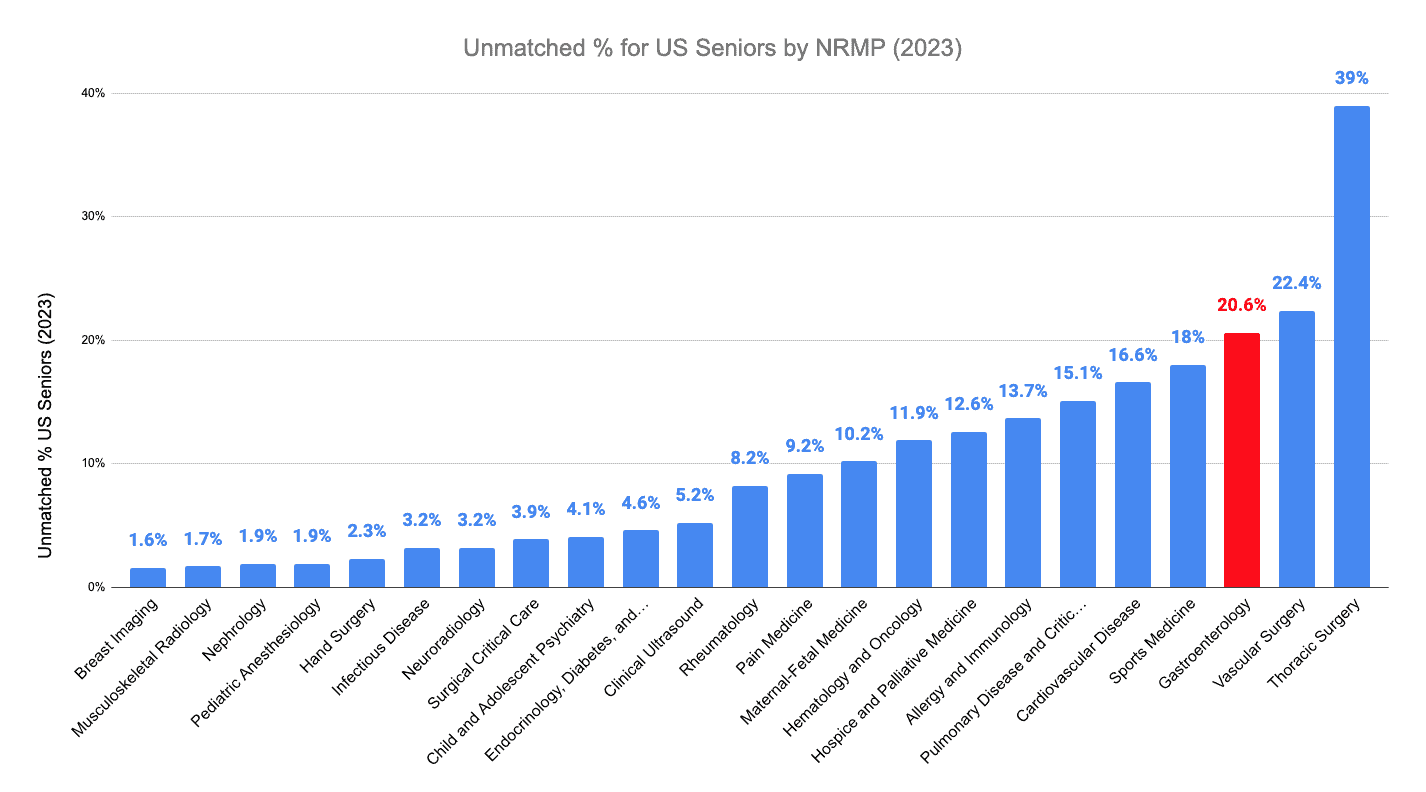
Gastroenterology vs. emergency medicine is one of the debates among medical students interested in physiology. Both specialties allow you to explore the complex workings of the human body and use your skills to improve patient outcomes. However, they also have significant differences, such as the scope of practice, the work environment, and the training requirements.
How do you decide which one is right for you? In this article, we will provide helpful information and tips to help you make an intelligent decision on gastroenterology vs. emergency medicine and find a fulfilling career that matches your interests and abilities. We will also help you evaluate practical factors such as job availability, salary, and training duration.
Gastroenterology vs. Emergency Medicine: Salary and Job Security
Gastroenterology might be your specialty if you want to earn a lot of money and have a steady demand for your services. But be prepared for a competitive job market after fellowship, even if you graduate from a prestigious program.
Emergency medicine, meanwhile, offers more job openings. You can easily find a hospital that needs emergency medicine specialists, and the career outlook is positive, even if the salary is not as high as gastroenterology. But emergency medicine also comes with some challenges, such as higher burnout and less job security, which we will discuss later.
According to recent data, gastroenterologists earn an average annual salary of $501,000, while emergency medicine specialists have a lower average salary of $352,000.
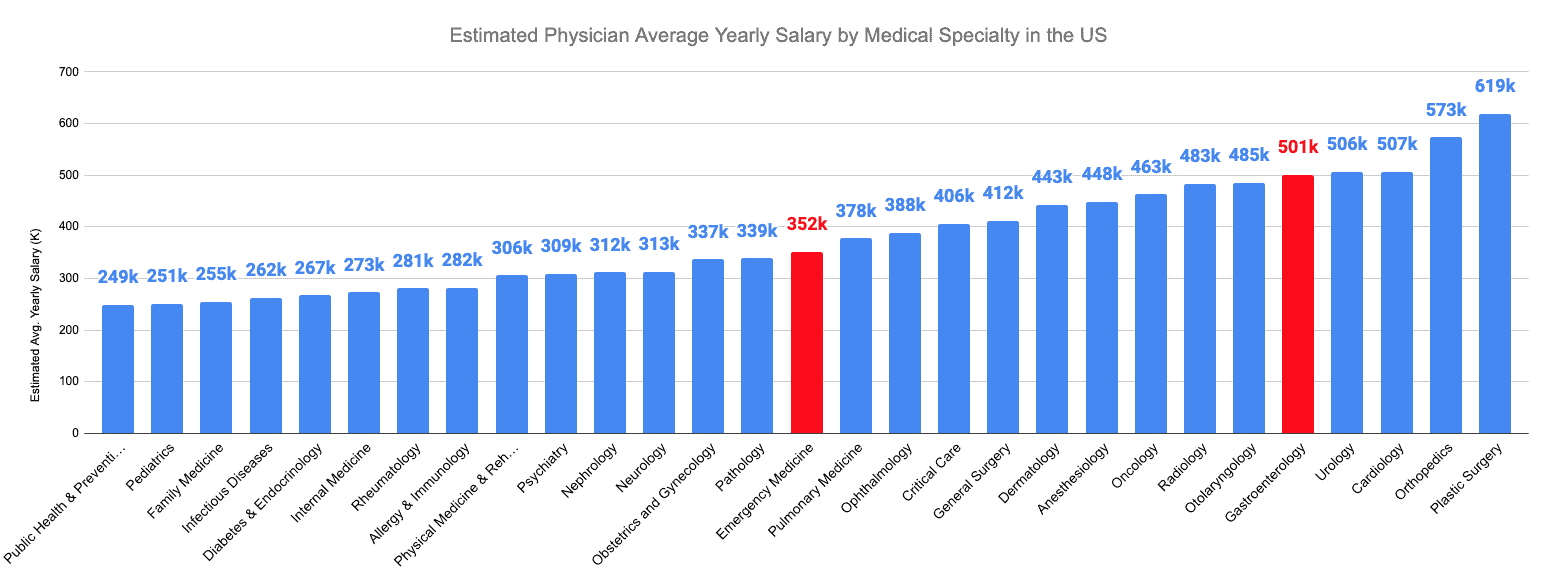
Gastroenterologists earn $501,000 per year on average, while emergency medicine specialists earn less with $352,000 annually
Gastroenterology vs. Emergency Medicine: Competitiveness
Here we can assess the competitiveness of a specialty by looking at the unmatched rate – the % of people who apply and do not match into their preferred specialty. For emergency medicine, the unmatched percentage among US Seniors was 1.9%, making it less competitive among US residencies.
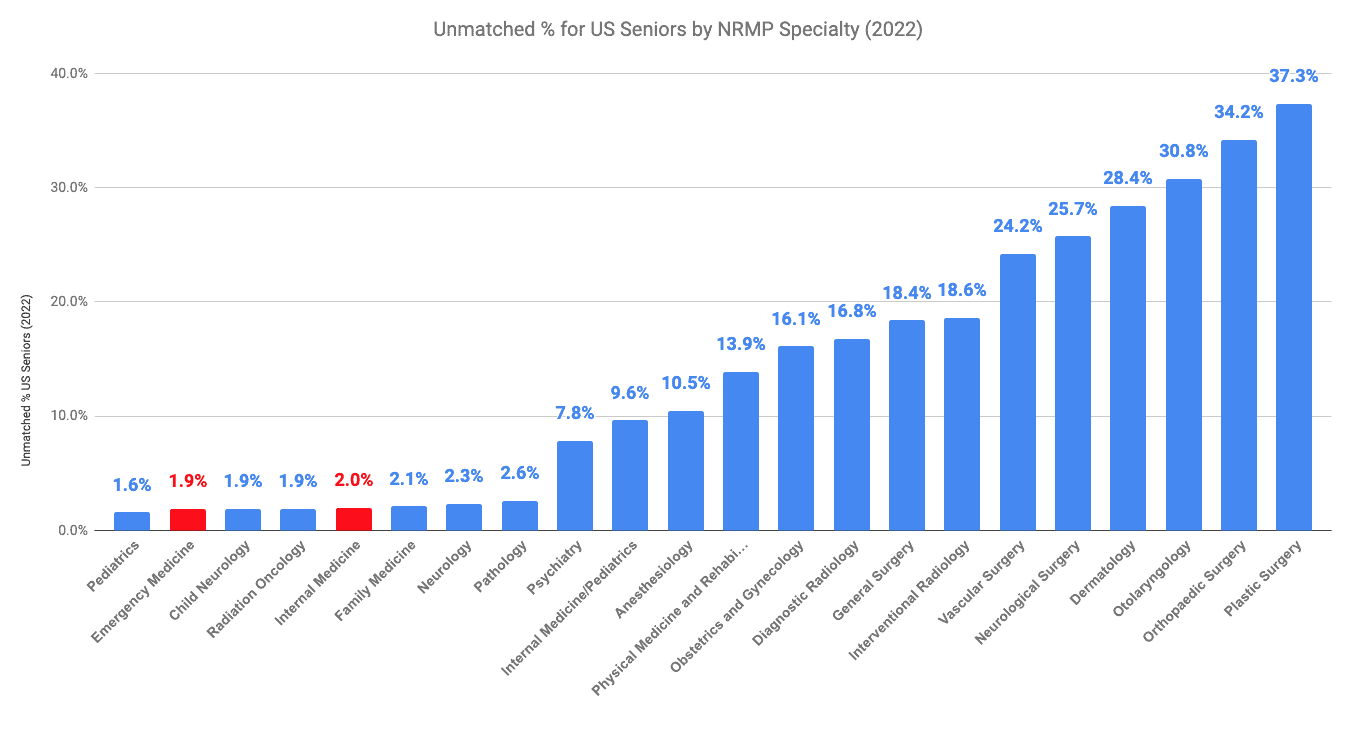
Emergency medicine had a 1.9% unmatched rate, while internal medicine had a 2% unmatched rate among US seniors
To pursue a career in gastroenterology, you must first match into an internal medicine residency. Among US Seniors, the unmatched percentage for internal medicine residency was only 2%, making it less competitive than other residencies. However, this does not mean that gastroenterology is less competitive. After completing your internal medicine residency, you will still need to match into a fellowship, which is generally more competitive than matching into a residency.
Below is the unmatched percentage among non-pediatric fellowships with >100 applicants. The unmatched percentage of US Seniors applying to the gastroenterology fellowship was 20.6%, making it highly competitive compared to most fellowships with >100 applicants.
Training Path: Fellowship vs Residency
To become a gastroenterologist, you must complete a three-year fellowship in gastroenterology after completing a three-year internal medicine residency. Emergency medicine involves a three to four-year emergency medicine residency.
A gastroenterology fellowship is typically more competitive than an emergency medicine residency. Your USMLE scores, med school, and research are the main things for residency applications. Research is also a big thing for fellowship applications, and your residency program counts more, but your USMLE scores matter much less.
Gastroenterology vs. Emergency Medicine: Work-Life Balance
Work-life balance is a crucial factor for many medical professionals. Gastroenterologists tend to have a better work-life balance as compared to emergency medicine specialists. This is because gastroenterologists usually have a more predictable work schedule and can take more time off. On the other hand, emergency medicine specialists have to work in shifts, including nights and weekends. They deal with unexpected emergencies, making their schedules less predictable.
Gastroenterologists work an average of 52.3 hours, ranking near the middle of all medical specialties. In comparison, emergency medicine specialists work fewer hours with 44.4 hours, ranking at the lower end.
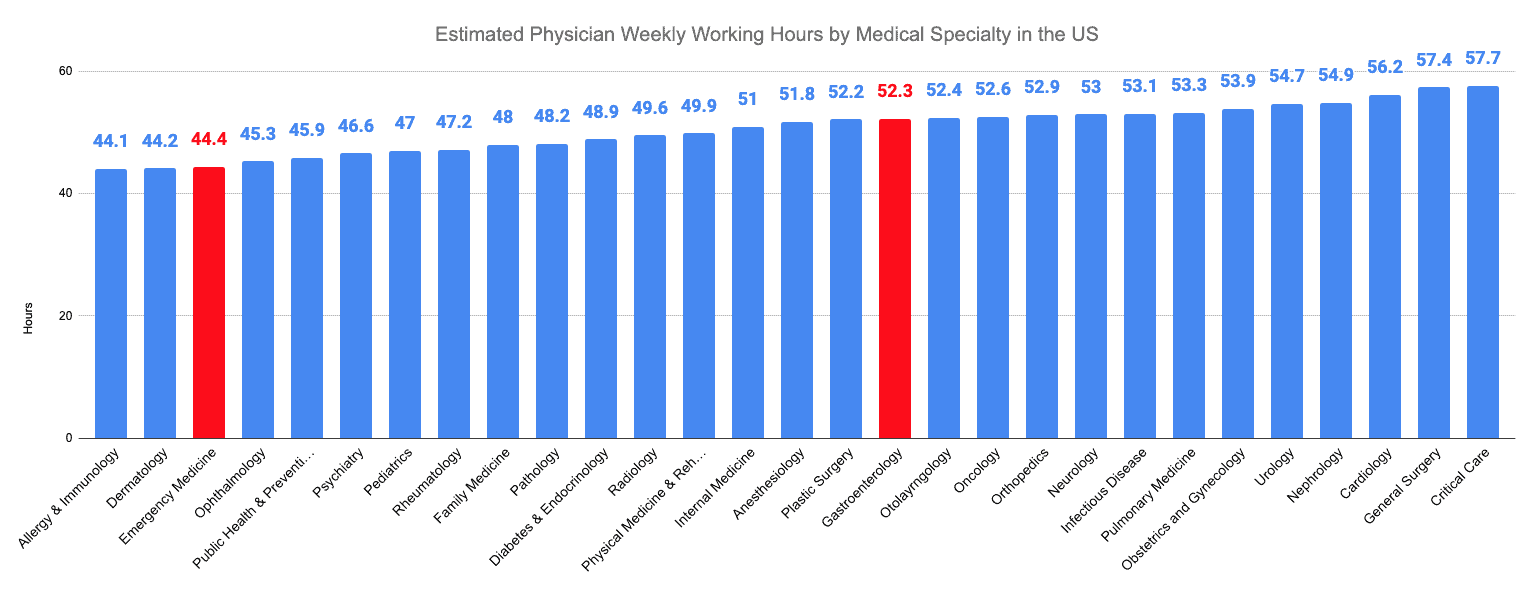
Gastroenterologists work an average of 52.3 hours per week, while emergency medicine specialists work fewer hours, at 44.4 per week.
Both gastroenterologists and emergency medicine specialists require administrative paperwork tasks, such as referral letters and diagnostic tests, resulting in an estimated 13 hours of admin/paperwork per week.
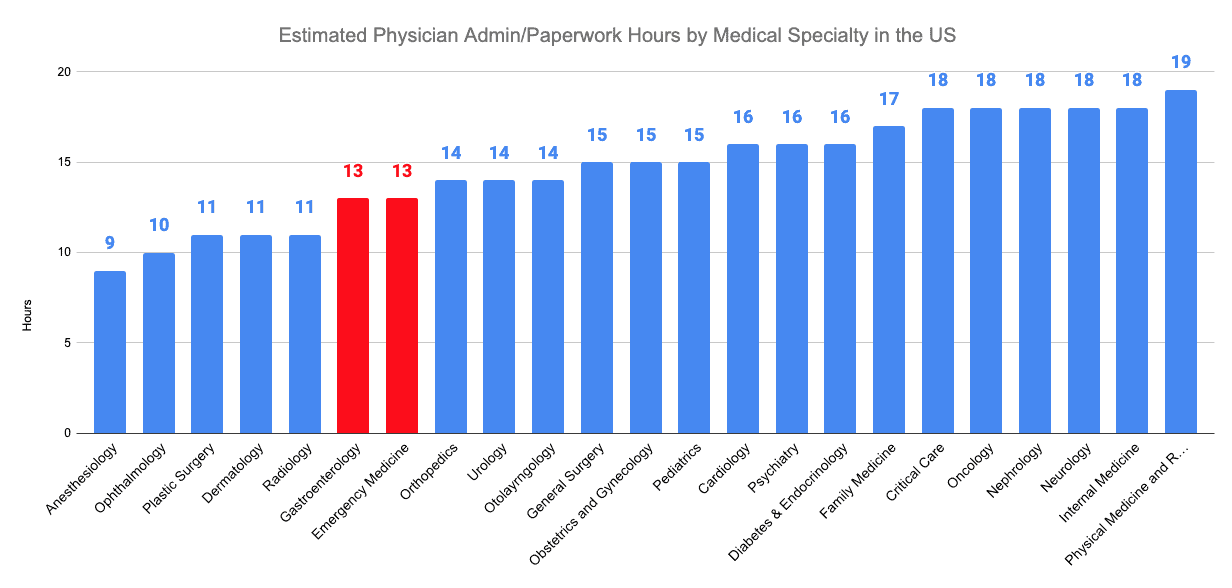
Both gastroenterologists and emergency medicine specialists work on admin/paperwork an average of 13 hours per week.
Training Duration and Subspecialties
The training duration is a key aspect to consider when choosing between gastroenterology vs. emergency medicine. Emergency medicine has a three to four-year training period, while gastroenterology has a six-year training period with three years of internal medicine residency followed by a three-year gastroenterology fellowship
Additionally, gastroenterologists often pursue more subspecialty training in fields like advanced endoscopy or hepatology because of the scarce job opportunities. This can increase the length of your gastroenterology training.
Gastroenterology vs. Emergency Medicine: Job Satisfaction and Burnout Rates
Job satisfaction plays a significant role in career fulfillment. According to various studies, gastroenterology tends to have higher job satisfaction rates than emergency medicine. Many gastroenterologists express contentment with their career choice and would choose it again if given the chance. Additionally, gastroenterology has a lower reported burnout rate than emergency medicine.
According to recent data, gastroenterology ranked near the upper end of all medical specialties with 92% of gastroenterologists stating that they would choose the same specialty again, while emergency medicine ranked lower with 74% of emergency medicine specialists feeling the same way.
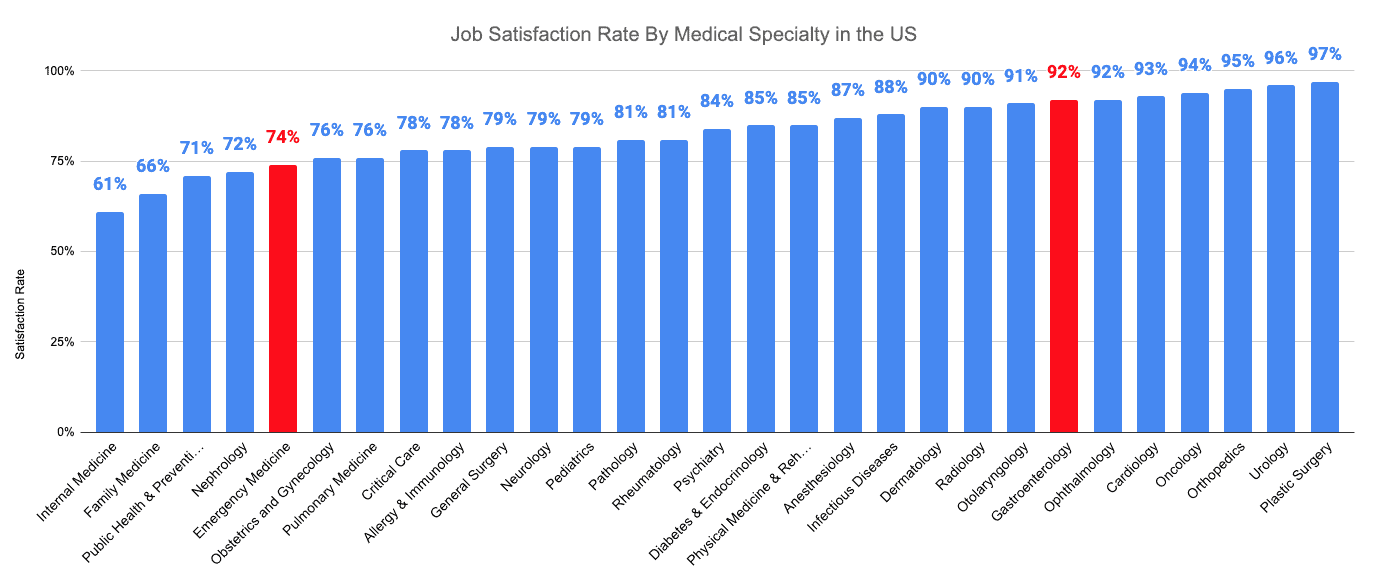
Gastroenterologists reported a 92% job satisfaction rate, while emergency medicine specialists reported lower satisfaction with 74%
That being said, the burnout rate for gastroenterology was 52%, ranking near the middle of all medical specialties. In comparison, emergency medicine had the highest burnout rate at 65%.
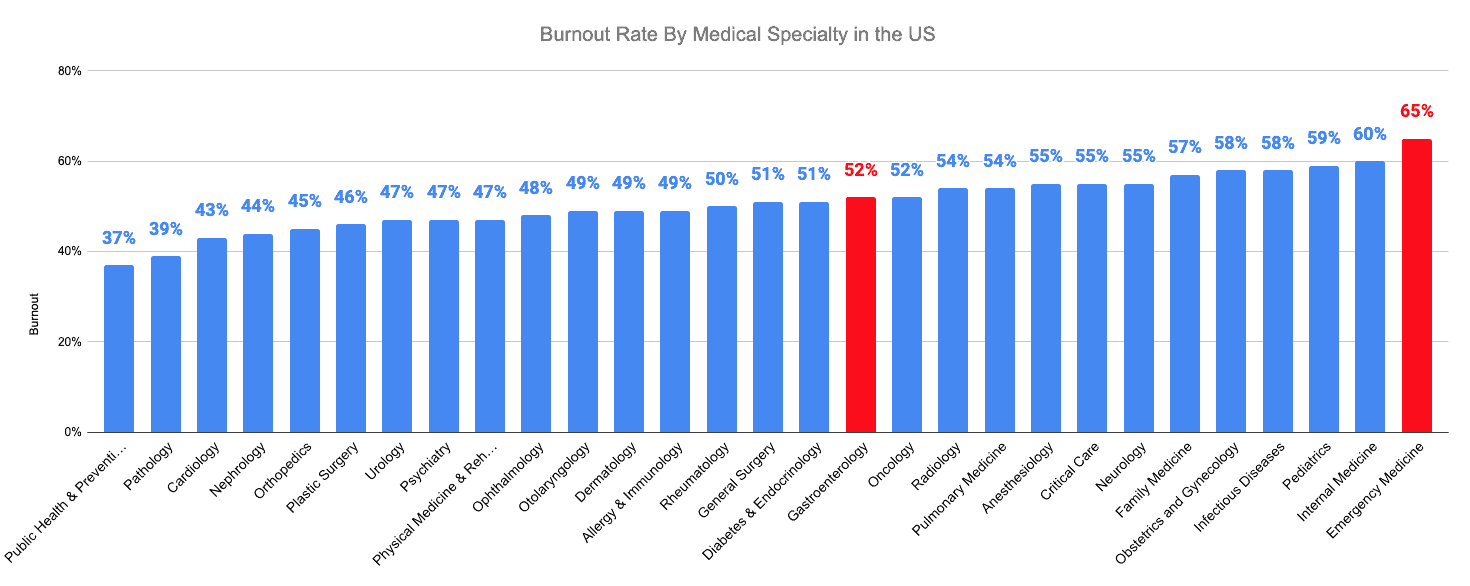
Gastroenterologists have a burnout rate of 52%, while emergency medicine specialists have the highest burnout rate of 65%.
Gastroenterology vs. Emergency Medicine Comparison
To provide a visual overview, here’s a table comparing gastroenterology and emergency medicine:
| Aspect | Gastroenterology | Emergency Medicine |
|---|---|---|
| Average Salary | Generally high salary as demand grows for procedures like colonoscopies. | Varied, but lower than lower than gastroenterology |
| Job Security | High demand due to the prevalence of gastrointestinal disorders | High demand due to the necessity of uninterrupted emergency coverage |
| Training Path | Typically involves 3 years of internal medicine residency followed by a 3-year gastroenterology fellowship | Typically involves 3-4 years of emergency medicine residency. |
| Lifestyle | Typically regular working hours, but may also have on-call duties | Typically irregular and unpredictable working hours, with on-call duties and rotating shifts |
| Administrative Paperwork | Moderate documentation requirements for patient records and surgical plans | Moderate documentation requirements |
| Job Satisfaction | High | Lower |
| Burnout Rates | Moderate | Higher |
| Personality | Strong communication skills for patient education | Strong decision-making and multitasking skills, ability to remain calm and focused in high-pressure situations |
Please note that this table serves as a general comparison. To determine the most suitable career for you, consider your personal and career priorities and goals.
Concluding Thoughts
Choosing the right specialty between gastroenterology vs. emergency medicine depends heavily on your priorities. To determine this, try reverse engineering your ideal life and identify your top priority. A helpful exercise is to write down the top five things you want to achieve in your career and personal life. Knowing these priorities will make finding a career that aligns with them easier. Often, the biggest obstacle is not a lack of knowledge about different fields but a lack of self-awareness about our own preferences.

